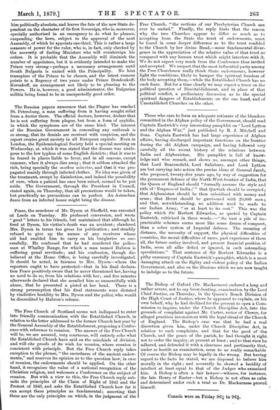The Free Church of Scotland seems not indisposed to enter
into friendly communication with the Established Church, in relation to the letter addressed to the former Church last year by the General Assembly of the Establishment, proposing a Confer- ence with reference to reunion. The answer of the Free Church will be, we are assured, very courteous, will entirely echo what the Established Church have said on the mischiefs of division, and will cite proofs of its wish for reunion, where reunion is consistent with principle. But the Free Church reply takes exception to the phrase, "the sacredness of the ancient endow- ments," and reserves its opinion as to the question how, in case of reunion, the endowments should be applied. On the other hand, it recognises the value of a national recognition of the 'Christian religion, and welcomes a Conference on the subject of reunion. But with a view to this, the Free Church reply sub- mits the principles of the Claim of Right of 1842 and the Protest of 1843, and asks the Established Church how far it can accept these principles as fundamental; asserting that these are the only principles on which, in the judgment of the
Free Church, "the sections of our Presbyterian Church can ever be united." Finally, the reply hints that the reason why the two Churches appear to differ so much as to accepting from the State the trust of endowments, must be found in some deeper difference as to the trust confided to the Church by her divine Head,—some fundamental diver- gence in the appreciation of the relative value of that trust as compared with any human trust which might interfere with it. We do not expect very much from the Conference thus invited and accepted. We suspect that the most influential party among the Free Churchmen really think State endowments, however light the conditions, likely to hamper the spiritual freedom of the body accepting them,—while the Established Church has no such fears. But for a time clearly we may expect a truce on the political question of Disestablishment, and in place of that political conflict, a preliminary discussion as to the special spiritual dangers of Establishments on the one hand, and of Unestablished Churches on the other.


































 Previous page
Previous page